by Brian Hioe
語言:
English
Photo Credit: Brian Hioe
A Defeat For Civil Society?
WITH THE passage of the Tsai administration’s planned changes to the Labor Standards Act this morning, it seems that organized labor, Taiwanese youth activists, and Third Force parties have suffered a defeat. As a result, this morning saw protests outside the Legislative and Executive Yuans, with smoke bombs and ghost money thrown at government buildings.
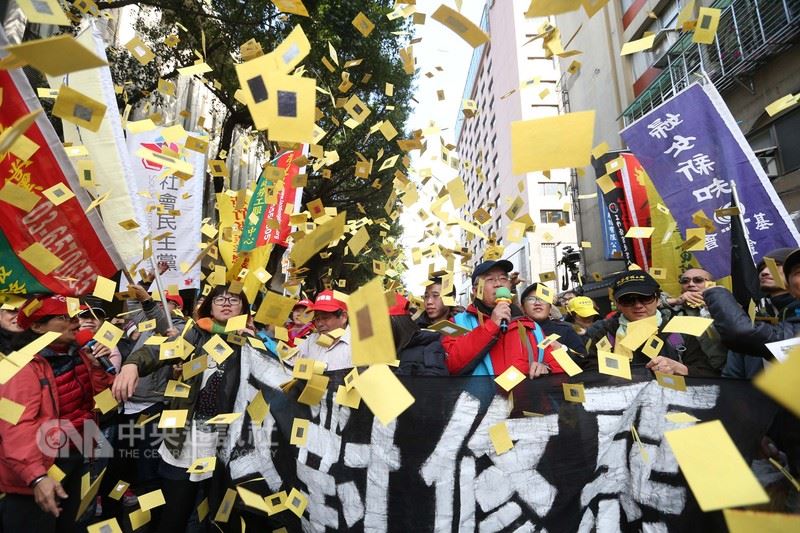 Protests this morning. Photo credit: CNA
Protests this morning. Photo credit: CNA
Although some call for escalating actions, numbers in the occupation in front of the Legislative Yuan have notably thinned, and they may soon withdraw. Future actions remain to be seen.
As such, it may be worthwhile considering what future steps will be now. Namely, while youth activist and labor groups have suffered a defeat, they could actually stand to gain in the future from outrage against the DPP for its actions. It is also worth considering why exactly protests against the Labor Standards Act did not become a large-scale protest movement along the lines of the Sunflower Movement even if, as Lin Fei-Fan posited in his open letter to Tsai Ing-Wen, this certainly has been the largest political crisis of the DPP in its one year and seven months in power.
Missteps By The NPP?
MUCH BLAME has been laid at the feet of the NPP, the only post-Sunflower Movement Third Force party which currently has legislators within the Legislative Yuan. The NPP took a strong stand on the issue, possibly gambling all of its political capital on the labor law issue through its five legislators engaging in a hunger strike, seeing as it normally does not engage in direct action. Many already view the NPP as prone to behaving in a politically irrational manner, due to the party’s origins in street protests and youth activism, and so the NPP refrains from direct action usually because it needs to maintain the appearance of a respectable political party.
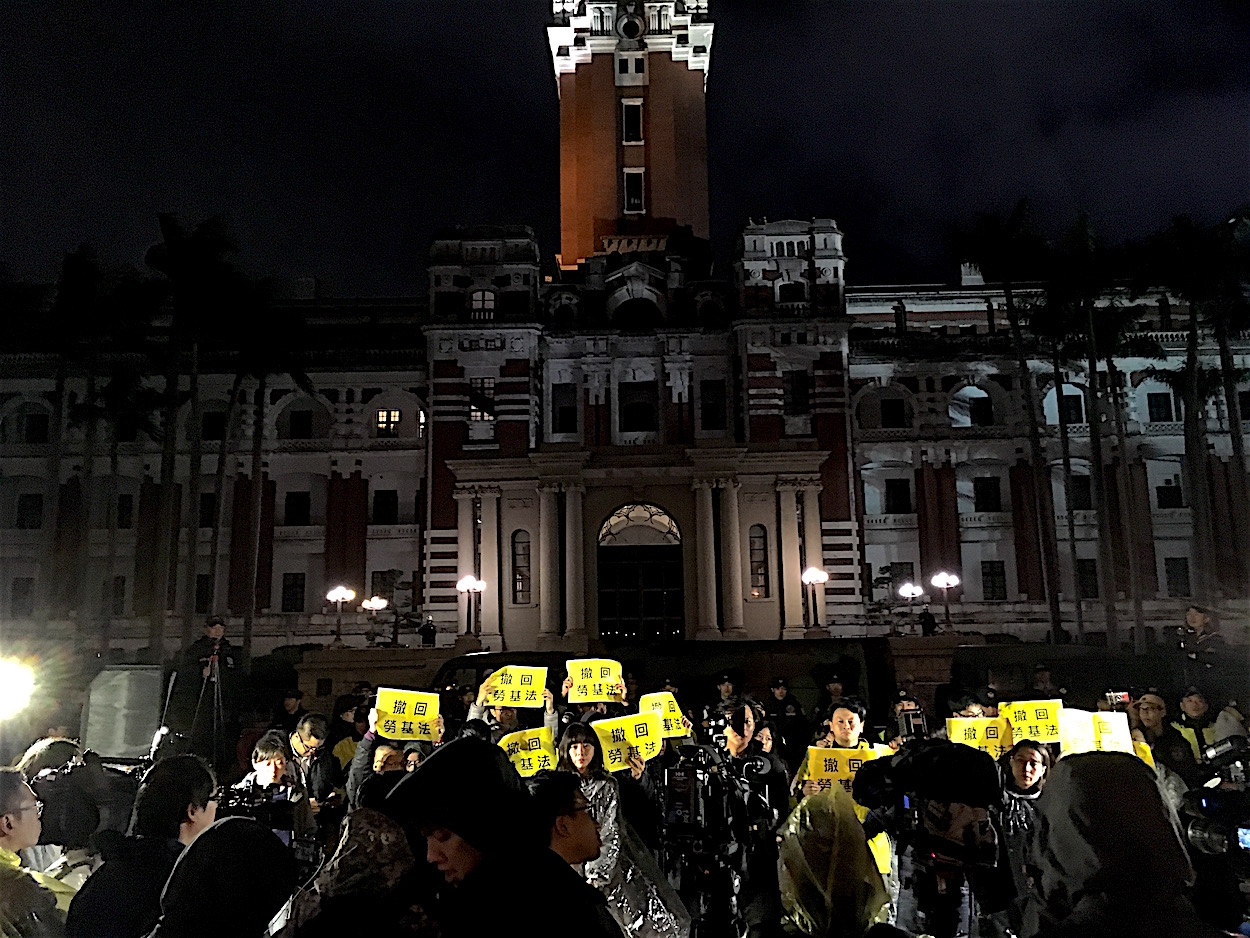 NPP members holding placards in front of the Presidential Office. Photo credit: Brian Hioe
NPP members holding placards in front of the Presidential Office. Photo credit: Brian Hioe
If the NPP continually engaged in direct action, this would lead to criticism of the party for always engaging in political theatrics. It was already easy for the DPP to leverage on the accusation that the NPP was seeking to “put on a show” with its demonstration, never mind that the DPP had behaved similarly in its many years as an opposition party through staging street protests, engaging in hunger strikes, and the like. The NPP’s playbook in protest tactics, in fact, largely seems to be drawn from the DPP.
Indeed, if the NPP frequently engaged in direct action, the effectiveness of that action would decrease every time. This was the mistake that labor groups such as Workers’ Struggle made from the beginning, in continually engaging in hunger strikes over the issue from the get-go during demonstrations against the Tsai administration’s previous changes to the Labor Standards Act last year, until new hunger strikes received little attention.
Certainly, there have been missteps by the NPP. Although the NPP may have believed that Ketagalan Boulevard would be a good location for its hunger strike, given that Ketagalan Boulevard has served as the site for large-scale protests in the past, the NPP probably did not expect police to take such drastic action to wade in the NPP. in setting up three sets of barriers in the half kilometer around the Presidential Office. Likewise, some have also suggested that the NPP “declared war” too early, and should have reserved drastic actions about the issue until a later timing.
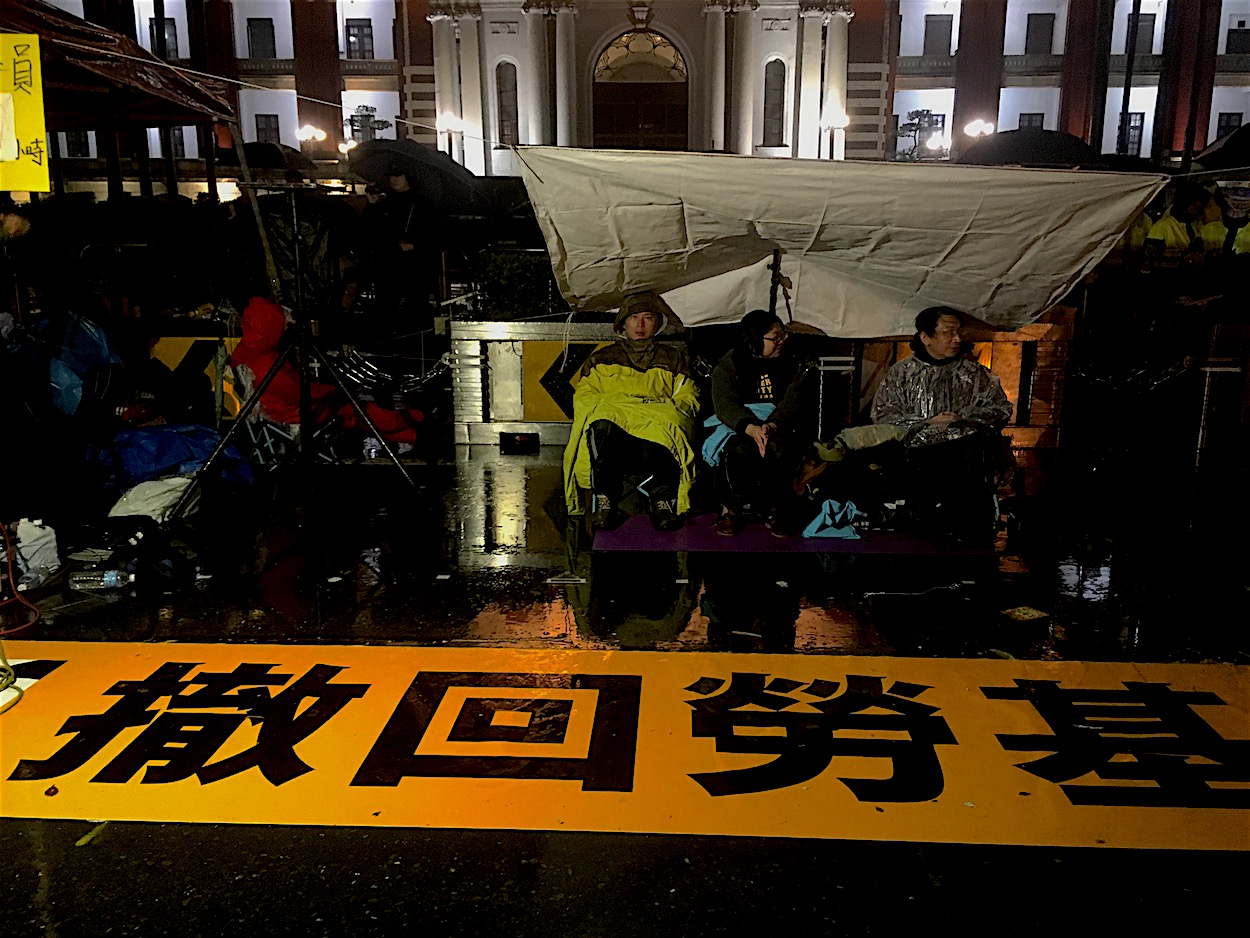 NPP legislators on hunger strike. Photo credit: Brian Hioe
NPP legislators on hunger strike. Photo credit: Brian Hioe
The NPP likewise confined its actions to within the restricted area and probably should have tried to organize actions outside of the restricted area, possibly because the precedent of the Sunflower Movement led the party to think that it could remain an enclosed space, such as the Legislative Yuan or on Ketagalan Boulevard, and this would prevent supportive protest from breaking out in the immediate vicinity. Yet the restricted area may have simply been too large, dwarfing anything seen during the Sunflower Movement. Through demonstrating on Ketagalan Boulevard and through its messaging, the NPP also seemed to be directing its messaging towards Tsai Ing-Wen, hoping that she decide to shelve the policy and superseding William Lai’s authority, adhering to the tactic that both Taiwanese youth activists and labor activists frequently adopt of hoping to win over public opinion in order to force political leaders to back down from their planned actions, a tactic which in itself has limits.
Limiting Factors On Mass Protest
THERE, TOO, are other factors at play. Limiting mobilization from labor groups and other forces is the fact that exhaustion from the Sunflower Movement three years ago persists to the present, to some extent, and there is few precedent for protesting against the DPP. When Chen Shui-Bian took power for the first time, one also saw a decline in Taiwanese civil society, with a sharp rise in inertia among civil society groups, and some members of civil society entering the Chen administration as government officials
For any mobilization over one thousand people regarding any issue whatsoever to take place, including the anti-nuclear movement, 228 commemorations, land issues, has been quite difficult since the Sunflower Movement and since Tsai Ing-Wen took office, though the exception to this is probably the marriage equality movement. With current protests against the DPP, while the Sunflower Movement drew on outrage against the KMT that had accumulated over many decades, the DPP only has so many years in office.
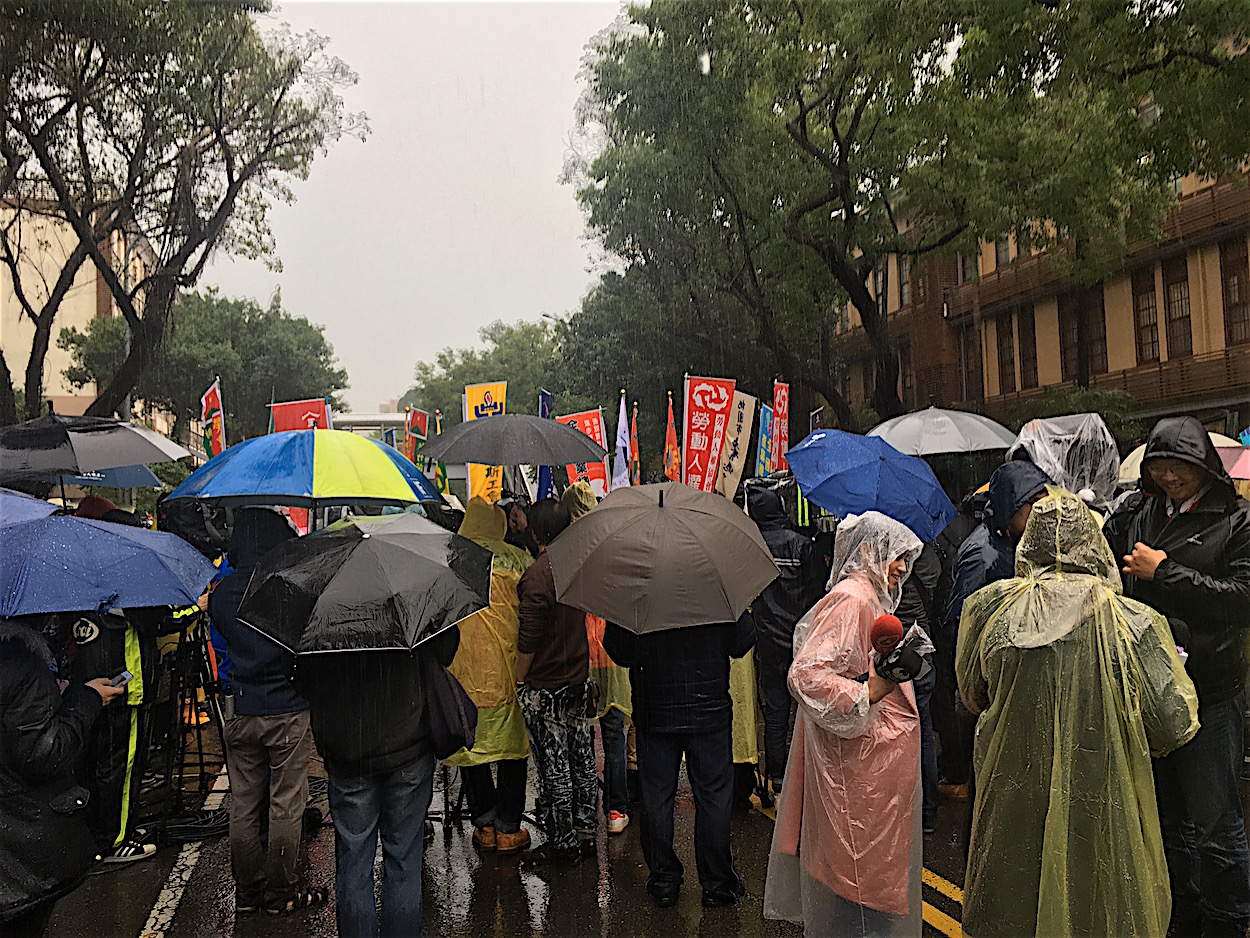 The occupation in front of the Legislative Yuan. Photo credit: Brian Hioe
The occupation in front of the Legislative Yuan. Photo credit: Brian Hioe
Faith in the DPP has not yet been broken for many, who may remember times in which the DPP had decidedly more progressive politics, or have an emotional attachment to the DPP due to its origins in the dangwai movement. These are factors which have proven limiting to large mobilizations against the Tsai administration taking place.
No matter how one looks at poll results, it is not the case that the Taiwanese public is overwhelmingly opposed to planned changes to the Labor Standards Act. But polling suggests divided results. The highest polling states that 60% of Taiwanese support the DPP’s planned changes, while other polls suggest that 60% oppose the planned changes. And so polling is not a reliable indicator here of opposition to changes to the Labor Standards Act, dividing, as is typical with Taiwanese political polling in the media, along partisan lines. Polling generally suggests that most Taiwanese support changing the Labor Standards Act, rather than maintaining the current Labor Standards Act, but that does not mean support for the DPP’s current set of revisions, seeing as the DPP’s revisions last year were also unpopular.
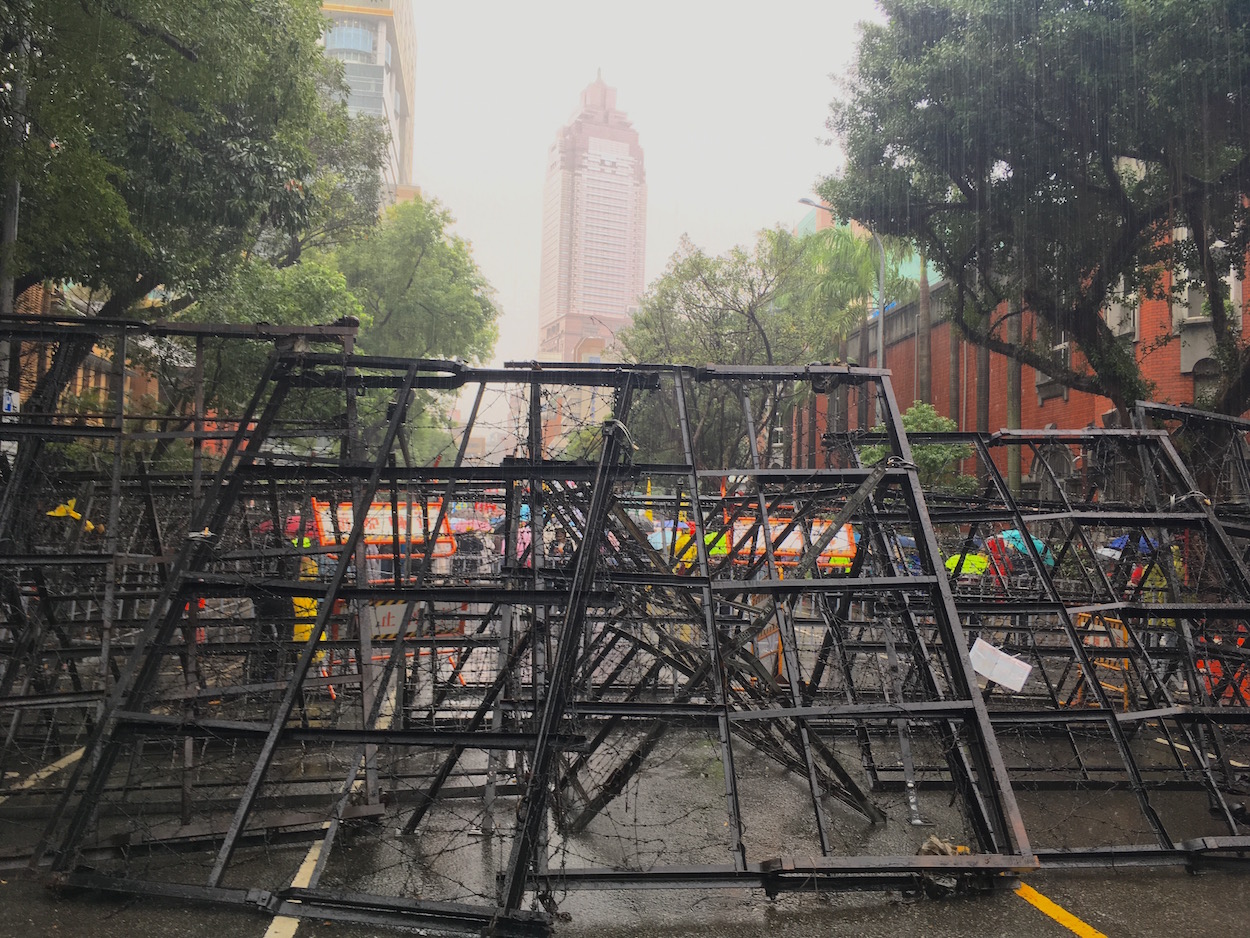 Photo credit: Brian Hioe
Photo credit: Brian Hioe
And one should remember that in the years before the Sunflower Movement, only a few hundred mobilized to demonstrate issues which similarly affected all of Taiwanese society, such as the anti-media monopoly movement regarding Chinese capital buying up Taiwanese media and, in that way, steering political discourse in the direction of pro-unification sentiment. And actually, one also needs to remember that there were only a few hundred people on the night of 318 when fifty or so students charged into the Legislative Yuan, a vanguard action which eventually led to mass support from society. In this sense, participant numbers were not dramatically less than the actions which kicked off the Sunflower Movement, a movement that eventually mobilized 500,000 to take the streets of Taipei.
As such, it may be in part because of contingent reasons and uncontrollable factors that mass protests did not break out this time around. Yet in general, in assessing any protest movement, it is always a combination of mistakes made and uncontrollable factors which leads to failure, never wholly one or the other.
The Coming Storm?
BUT THE obvious fact is that changes to the Labor Standards Act will significantly worsen the situation of Taiwanese workers. It is truly hard to see how they wouldn’t. Under new regulations, workers may be made to return to work without even a full eight hours of sleep, could be made to work twelve consecutive days, would have no set days off per week, meaning that their schedules could wholly be at the behest of their employers, and have an overall decrease in overtime pay.
 Photo credit: Brian Hioe
Photo credit: Brian Hioe
Taiwanese are already forced to work long hours for little pay and have little way of resisting their bosses due to low rates of unionization among Taiwanese workers. Now, the DPP has given bosses even more power. While some of these new changes supposedly require the permission of unions, given that Taiwan is already plagued by a number of management-friendly unions which serve as mechanisms of regulating workers rather than of standing up for their rights, one expects to see even more management-friendly unions rise up in Taiwan.
Outrage against the DPP’s changes to the Labor Standards Act last year, which preceded the current set of changes, were quick because a large number of Taiwanese companies assumed that these changes would take effect quickly and began adjusting their schedules before the changes actually took place, meaning that the changes actually took effect before they were legally enforceable. This does not seem to have happened this time, with the current set of changes to the Labor Standards Act, since DPP subsequently made things confusing for many Taiwanese companies last time around when it became uncertain about whether it would actually pass these changes or not, and companies do not seem not started adjusting their work schedules early because of this past precedent for uncertainty.
And so when the bill takes effect, considering that the NPP has a clean record on opposing the Labor Standards Act from the beginning, even undertaking drastic forms of direct action to try and prevent the bill from passing, the resultant outrage against the DPP could actually benefit the NPP. The NPP, alone, of all political parties in Taiwan within legislature, has undertaken drastic forms of direct action to oppose the bill. Even if it is only 40% that oppose the DPP’s planned changes to the Labor Standards Act, this 40% could become a substantial support base for the NPP, for example.
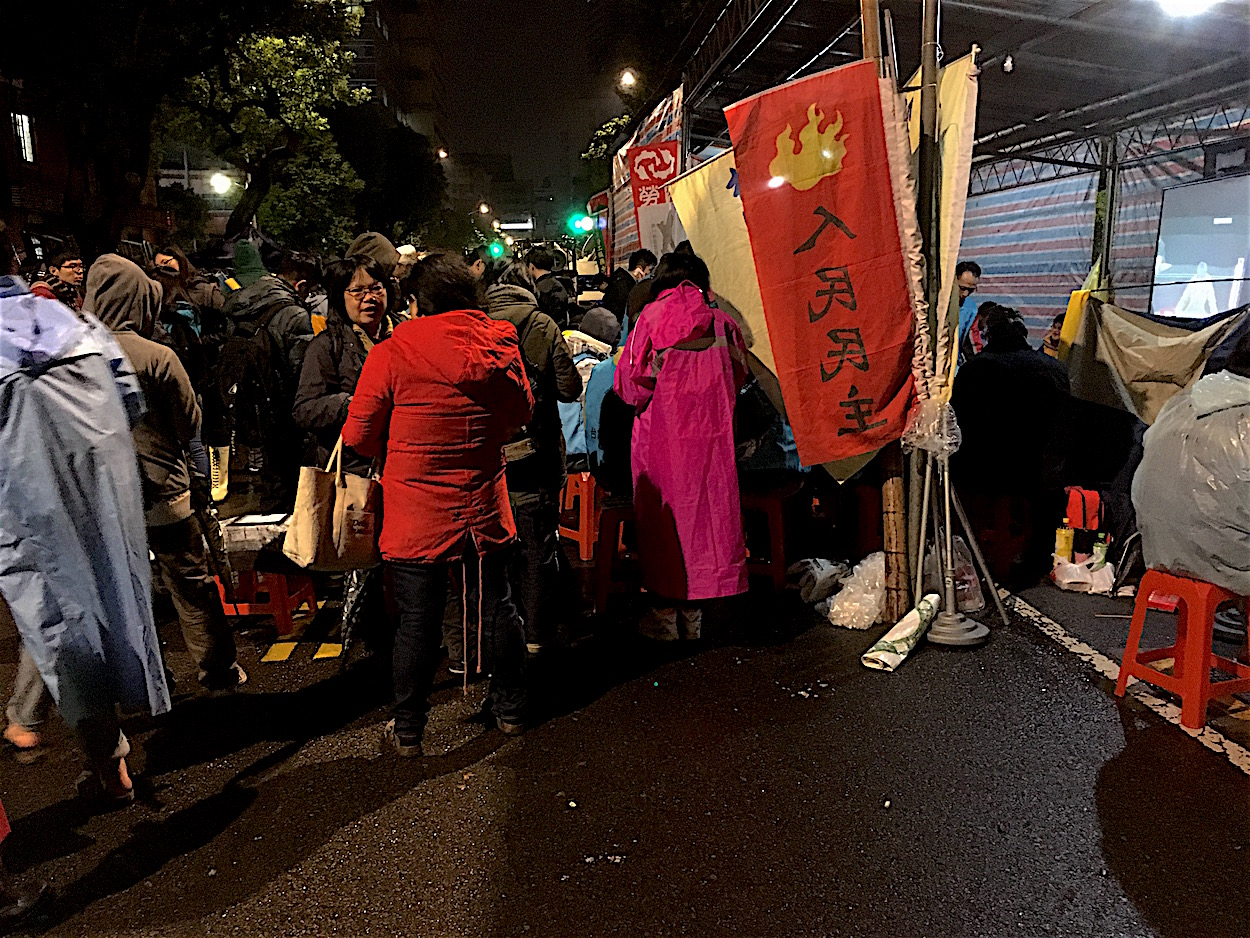 Photo credit: Brian Hioe
Photo credit: Brian Hioe
Other Third Force parties currently without seats in legislature that also oppose the DPP’s planned changes, could also stand to reap the benefits of firm opposition to the Labor Standards Act. The KMT, which only latched onto the issue as a way to attack the DPP, will also try to point to its record on the issue, but claims by the KMT that it is on the side of labor are too easily refuted given its past record dating back to the authoritarian period, the past record of Ma administration, as well as that many decades of outrage against the KMT have not been forgotten.
The DPP seems to have been motivated to pass the changes to the Labor Standards Act to please Taiwanese business interests, in order to cut costs so that they will maintain production and business in Taiwan, rather than fleeing to China or other countries in which production is cheaper. In this way, the DPP demonstrates that it is the party of the domestic Taiwanese bourgeoisie, rather than the cross-strait hopping bourgeoisie which the KMT is the party of, although one generally suspects that significantly increasing working hours in Taiwan when Taiwan already works the fourth longest working hours in the world and Taiwanese work the most on vacation in the world—more than China. This may only increase the labor outflow from Taiwan, making Taiwan even more of a “ghost island.”
And so ultimately, it may be that in the long-term, the crisis of the DPP regarding changes to the Labor Standards Act provides space for Third Force parties to grow. Yet this will be an uphill struggle.
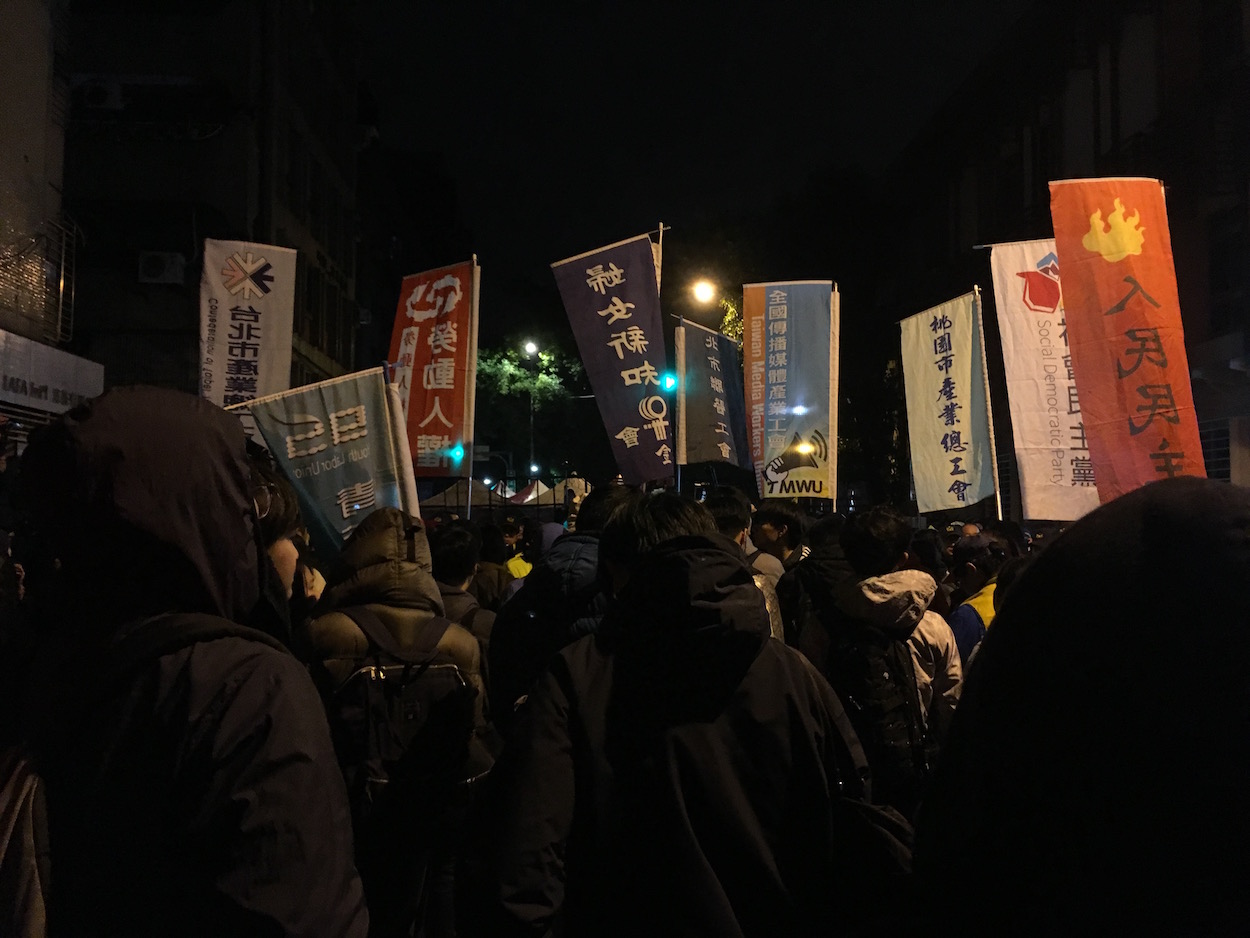 Photo credit: Brian Hioe
Photo credit: Brian Hioe
The DPP evidences political hypocrisy in attempts to smear protests against the Labor Standards Act, then, including attempting to smear the NPP with guilt by association with the KMT because the KMT has latched onto the issue opportunistically, never mind that the NPP, too, has little love for the KMT as a post-Sunflower Movement Third Force party. Yet these smears still gained a surprising deal of traction in pan-Green media, because some still have blind faith in the DPP, and this leads to fuzzy thinking about the role of the NPP and other Third Force parties.
This may be the present challenge of Taiwanese politics—to break with the DPP in a manner which advances the progressive politics which the DPP no longer is the standard bearer of—and it is not surprising that this is a challenge. It was once easy to demonstrate against the KMT, both as a political force of political conservatism and one intent on unifying Taiwan and China, seeing as if the former did not inspire outrage from the public, the latter would. Now one must demonstrate against the DPP’s increasing conservatism and its craven nature before business interests, even if the DPP may be “native”, homegrown political party to Taiwan. This may be a generational task and it may be one which requires another political awakening.

